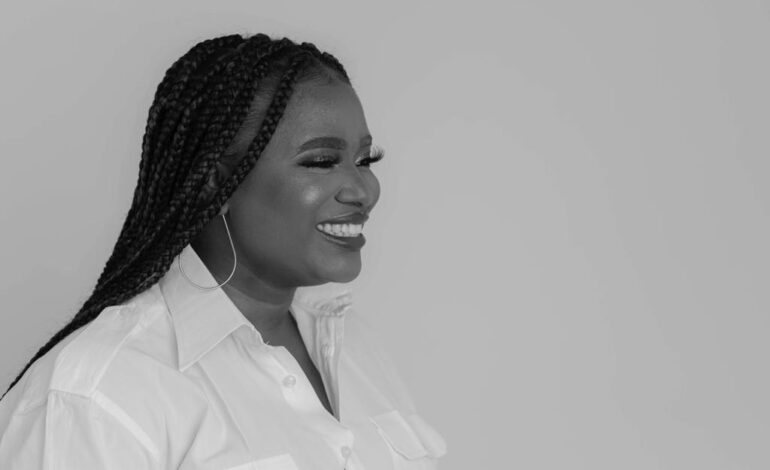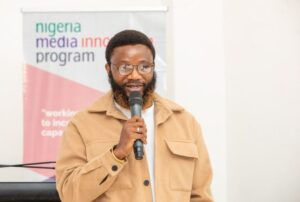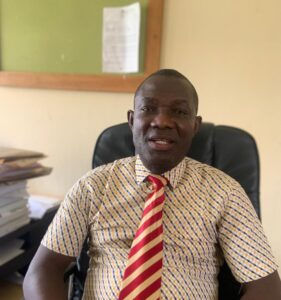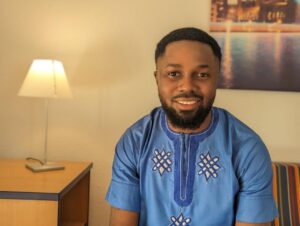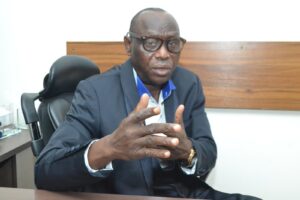Until September 2022, she was the Editor of HumAngle+ and had earlier served as Managing Editor and Head of the Newsroom at HumAngle Media.
Anita Eboigbe, Co-founder of Inside Nollywood and former Film Journalist/Box Office Analysis Lead at the News Agency of Nigeria in this interview with Lekan Otufodunrin speaks on her new role at Big Cabal Media and other major issues in Nigeria’s media industry.
The recent announcement of your exit from HumAngle came as a surprise considering the great work you are doing with the team as the Managing Editor. What’s next?
I had been at HumAngle since the beginning, and the team had grown so well that you just don’t know at what point the team would be able to carry itself with all the teachings, structures and learnings.
And for me, I just wanted a chance to test other theories that I had. At the time I left Human Angle, I had now become the editor of Human Angle Plus, which is going to launch very soon, which was also what we won the Google News Initiative Fund for. It was also a surprise to me. I think that I just really woke up and just wanted to challenge myself more, and that was really what it was about.
I took a little break to try and refocus myself and to try and figure out where my skills would be most useful in sense of how the media industry is growing or not growing. Everybody knows that I’m passionate about the media industry, growing, and expanding, especially with the infusion of product thinking in the industry.
So a lot of what I’m doing after HumAngle is just building on that. A very primary thing that I have been doing is intensifying my building of Inside Nollywood, which is a platform that I created with my co-founder, Daniel Okechukwu, to increase the quality of conversations that I had about the Nigerian film industry.
I am currently at Big Cabal Media, the publisher of Zikoko and now Citizen. A lot of my focus is on Citizen. It is a platform that technically doesn’t exist, so we’re trying to bring it off the ground and make it valuable to the audience. The kind of content is political, civic engagement, governance, and social justice, but not in the air-tight way that we write it. Not in what people are used to me leading the newsroom for. I have led in the newsroom, I wrote more serious stuff.
What should be the expectations of readers of your new platform in terms of the impact you want to make and the kind of content you want to introduce?
Citizen is going to write really serious stuff, but we are going to write it in ways that the audience, the young audience can understand because nowadays, there is an increasing level of attention that the political and civic engagement space is getting from young people. And we need to keep them engaged. We need to keep them informed.
We need to create content that they can relate to, and that also reflects the realities of the country. Beyond that, Big Cabal is really very focused on telling stories and shaping culture all around. So you can see that with what is being done at Zikoko and Tech Cabal.
So there are just a lot of expectations of the readers for Citizen. It should be, this is political content that you can understand. That’s really the one-liner.
In terms of impact, we want to have a generation of young people who are very informed.
So there’s passion and passion is great, but passion without the right information is like almost disaster waiting to happen. So we’re really looking to inform young people so that by the time they’re engaging, there’s clarity on what exactly they’re engaging on, and they are armed with the right information to do this.
People have not really created political and civic engagement content for young people in the past. And there’s the idea that it’s so hard to write things like that for them. That’s the beauty of being at Big Cabal. There is just so much experimentation. If this doesn’t work, we can experiment and try something else that works.
The platform is still very fresh, so definitely we are going to introduce all forms of as many as possible as you can tell. Mostly audio-visual and very explanatory web content around the core areas, which is civic engagement, social justice, governance and politics. It’s just been interesting, to be honest.
Tell us more about your building of Inside Nollywood and the film writing fellowship.
Inside Nollywood is a platform that sort of has taken a life of its own and which is really, really beautiful to be very honest. This platform has taken a life of its own and you just wonder why something like this hasn’t been created for the industry for a very long time.
It was December last year, and a film writer called Daniel Okechukwu and I sat down and came up with something. We’re just asking questions around like, what would it look like if we had a platform for Nollywood that was respected and what would it look like if we inspire the generation of people to open their own platforms for reporting Nollywood? What would it look like if our people really had a place where they could connect with the audience and the audience could connect with them, as stakeholders in the industry? And so it was really this huge experiment that none of us knew exactly how to go around. We just wrote down an outline.
I sort of carried it from there, just anywhere that the journey leads us, we would go. And the journey has led us to this place where we are probably like the most respected platform, where people know that when you come here you get quality discourse, and we’re constantly experimenting with stuff. We are now doing in-depth feature profiling of people in the industry that we feel the artistry has not been explored. We have Twitter Spaces conversations, we reckon that everything we are doing is so we can do the one thing that we said we wanted to do from the beginning, which is to improve the quality of conversations had in the film industry. However, we feel like that conversation is to be improved either through audio or through our journal, which is one of a kind in the industry.
We have another quarterly journal. We have another issue of the quarterly journal coming up. It’s just been a lot of work putting it together, but these are things that you do in an industry that needs to document because documentation is key, surely for art, especially when that art is now a business commodity in some way. You need to actually document things.
About the film writing fellowship, this is what I believe. I think that one of the ways you can know if an industry is growing is by the quality of people who write for that industry. Because I’m coming from the development space, one of the ways that development space has been able to improve itself is that there is constant training, and there is a pipeline that works. For film, people just usually cover film as a hobby. Hobbies are great. I have nothing against hobbies, but we really just want a situation where there’s sort of like a faculty.
So the beauty about the film writing fellowship is that there is an actual faculty and this faculty head, Precious Nwogu-Aboh, they do their thing. The goal is to train at least 40 new journalists every year and just fill the space up with people who are asking the right questions about the industry.
What it does is that if you improve the kind of questions that people in the industry are being asked, if you improve the quality of conversation, the quality of information that is available to the audience is better because the person writing it knows what they are writing about. What you’re doing is that you are inadvertently forcing, and upscaling the conversation where it’s supposed to matter because you know that there are at least 10 people who would ask you a serious question, who would write about your work from an interesting perspective. And the beauty about this is that every fellow that we pick has a different ability, so it’s not like, oh, we are picking only Essayists, or only feature writers. Everybody has a different ability which is just beautiful to watch.
They just submitted their first project. They are supposed to do three projects before the programme ends. They have submitted their first project, and then you can just see the different personalities, different perspectives come together, and that’s just the beauty of journalism.
I just like to say journalism is a play on perspectives and you can just tell the perspectives that are coming through with the things that these young people are writing, and a lot more will happen. The entire goal is to populate the amount of positive thinking, and amount of forward-thinking in the industry, through the quality of journalism that is in the industry.
As much as possible, we are just going to continue to do that. I am not a fan of just being like a very huge body that is almost like a roadblock because you don’t want any other person to shine. For me, it is how can we get this trade secret we have to as many people as possible and then let them develop their own trade secrets and let everybody grow and expand.
And that’s the point. That’s what has always held us back as media. Everybody is holding too close to “trade secrets in Nigeria”. And I’m like, No, you are blocking the space. Open it, expand it because there are many more products out there that you’ll be exposed to if you just allow for collaborative thinking.
So, beneath the whole teaching of the fellowship, the fellowship is just really a group of people who really love the industry and who love journalism, coming together to become a community that would actually cover the industry for sustainability.
READ ALSO: ‘How I launched newspaper, radio station in Taraba after national service’
What informed your recent tweet that “The biggest media failure isn’t even reporting. It’s that there isn’t enough development of the audience’s quality of thinking” and what needs to be done?
Recently, I actually tweeted that audience quality of thinking is something that we haven’t really invested in. In fact, a lot of the investment is supposed to come from how we report stories, and I’ll give you an example. A legacy paper, I’ve forgotten which, had the chance to interview Tobi Amusan, and the headline was about how her man would come at the right time.
You had the chance to interview a serial world record holder. Literally, this girl just spent the last four to five months breaking records, and that’s your headline. Because of the agenda setting theory of media, what is happening is that the audience starts to think in the line of the thing that you amplified the most.
And a lot of times, the media amplifies the poorest things the most. So what happens is that over the years we have built an audience that is drawn to the poorest things. And by the poorest things, I mean the most undignified things, the most non-critical things. So we’re not inspiring critical thinking in our audience. And so when the audience gets exposed to stuff that challenges their inability to think critically, especially when it comes to what the audience is giving them.
So you have platforms like HumAngle come up and we are publishing things like this that are in-depth and all of that. You have platforms like Tech Cabal. Citizen is going to come out, and then people are struggling to grasp the idea behind it. They’re struggling to get behind it because their idea of what news should be like, of what the media should have given me is something that seems like gossip, something that is not refined, something that does not challenge me to think critically from the headline to like the fifth paragraph. We write in a way, especially legacy media, where we bury like the real critical cross of the matter in like paragraph four, and so the audience generally, when they get to paragraph four, they will say, oh, the gist is no longer sweet, the story is no longer sweet and they leave it there. The arrangement has just sort of always been a problem. And what we think is the attention span is not great, which is a problem.
I don’t think that the Nigerian media space has evolved to a point where we can say our audience’s attention span is not good. What we really have are spoiled children, pampered children who were ruined with low quality, low critical style of reporting.
What needs to be done is that we all need to reach a sort of consensus. It doesn’t have to be together. It just has to be underneath. The people who are emerging to lead media organizations should be able to agree that there is just some stuff we should not amplify.
Even if you are amplifying this stuff, there is language. Over time, if there’s a shift towards critical reporting, and by critical reporting, I don’t mean investigative reporting because we make that mistake a lot where our only critical reports are investigative reports, that’s not what I mean. What I mean is we need to be able to agree that even if it’s only like 50% of the media space, no headline is going to go out that is not critical, especially on critical issues, because you cannot turn critical issues into a gist. It doesn’t work that way. And then you’re angry that the audience does not read anymore. Newspapers used to be great. When you speak of newspapers then, it was solid from beginning to the end. But over time, you’ve just had everybody trying to be a blog like Linda Ikeji blog, and then you are at The Punch for God’s sake.
Why are you trying to be Linda IkejI? Where is Linda Ikeji’s blog now? It’s also part of the things that are affecting our sustainability. So what needs to be done is that we need editors that are going to train themselves. A lot of training does not have to be just at the baseline journalist, because if you have journalists who write critical stuff and then they’re being edited by editors who don’t think critically, then there’s a problem.
Editors really need way more opportunities sent their way. And that’s also an issue.
When I became an editor, it was so hard for me to find opportunities. Everything was a journalism fellowship and it bothered me. And maybe this is something that I will get behind one day and just fix because I’m not all for talking. I’m just all for like fixing issues that can be fixed. Maybe one day, but not today.
Editors need way more training opportunities aimed at them. They are shaping culture, they are shaping an audience. Every single thing that they let go is teaching some members of the audience that this is the new standard, this is what I should be listening to especially when it’s reinforced over and over again.
What is your general assessment of the media landscape in Nigeria?
My general assessment of the media landscape is that there is not a lot of honesty in the space. And honesty, I mean, a lot of people who even cover stuff in the space have no idea why they are doing the things that they are doing. So they are just, we are here because this is the way they said it’s easier to get dollars if you’re working for international organizations.
Campus journalism is now mostly a let’s out-beat each other on who is going to make the most money from an international organization.
Working for media houses is more now like I can’t wait to be known as a The Punch writer so that I can go to a new media and go and write.
The biggest problem in Nigerian media is that we are lacking perspective. Media is sweet when it is a trade of perspective when everybody comes in with their own perspective.
Now, even when you read editorials, there is no language, there is no stand. It’s just there. It’s just like a piece of really good written features. So, for a lot of us, the problem comes from audience development, which we are very terrible at. It comes from not understanding why we exist in the first place. It also comes from the fact that everybody seems to be chasing things that are very temporary. And that is just a Nigerian problem. Long-term thinking is something that is very rare within the industry. And that’s something we need to go around and tell people, teach people to think long term.
READ ALSO: ‘How I launched newspaper, radio station in Taraba after national service’
What does the future hold for professionals in the industry?
It is that if you don’t innovate, you lose. Innovate or die.
The audience is only going to be non-critical for so long. Because unlike in the days when you are the only one they are going to for information, now there are more options and partial journalism is back in a very subtle way. It used to be that foreign guys would come and cover your place, but now they are hiring cheap labour within the country to do it.
So what that means is that a time will come when you cannot have to report them, especially when you are not reporting things with no context that actually shows why you should be reporting within the industry in the first place. An example is the flood thing. Like every other person is covering the flood and then a foreign person covers it and Nigerians are like yes, this is the real one.
The truth is because every time that Nigerian media covers, the audience has been taught that it’s not just going to be critical, and because more than half the time they are correct, how do we get to a place where they are wrong?
Generally, if we don’t innovate around that, if we do not get to a point where we are very clear on what we want to achieve as Nigerian media, the future just doesn’t look great.
As someone who is interested in the Business of the media, what are your suggestions for having suitable business models?
This actually brings me to my speciality, which is the media business. My suggestions for business models that are sustainable are the ones that involve audience development. They are the ones that are realistic. A lot of business models that we have in the industry, say in Mac Authur Foundation grants, or maybe if foreign agencies decide that they no longer wanted to fund stuff, that is the end, everybody will go home.
Meanwhile, we have an audience that has shown that they can pay for like very stupid stuff. So if an audience can pay for very stupid stuff, why are we not getting them to pay for the very real stuff? That is a conversation that we need to have so that we can crack something.
Suggestions for having a sustainable business model really involve asking critical questions about why you are in business. First of all, do you see your media as a business? That’s the first place to start. So good, you passed the first test. You now see it as a business. The second thing is what kind of business do you see yourself as? That’s another question. The third thing is, are you ready to do the work that’s required to sustain a business? Because any business, whether it’s a media or whatever, there is work involved. Ask founders, and ask CEOs, there is heavy work involved.
There is just so much intellectual superiority that journalists have where it’s like, oh, because I have suffered to do this thing, you must read my work. And I get it because the work that we do is not easy. But as I’ve transitioned more, into the business and management side of things, there’s loneliness in the sense that I should be able to talk this through with people. But there’s just only a few people in the industry that I can talk things through with in this sense. And that’s because every other person has forgotten that they need to pay salaries, they need to expand. Media needs money to do the kind of evangelism that the moral of media requires it to do. That’s the thing. You want to be the gospel for information in a particular sector, you need money to be able to get the audience to do stuff.
The people who are currently cracking it, of course, Big Cabal is one and they have Stears Business and will just keep on experimenting, and that is what the medium business model for media is. Don’t be afraid to experiment, but also don’t be silly to not think that you need to have clear business goals. The model comes from knowing clearly what your business goals are.
What’s your advice for journalists to excel in the profession?
My advice for journalists is things take time. I feel like I had to just say that because it’s the truth. Things take time and as you grow in the profession, you really need to be clear on what it is in the profession you want to do.
I find that other people report and report, and by the time they get to say 45 or 50, there is fatigue, and they don’t know what to do next.
I say everywhere I go and talk to journalists that there are a thousand and one things to do in media. Of course, it’s a bright idea to start as a journalist because it gives you a perspective that all people would not have.
But there are a thousand and one things to do in media, and the media space is so large, and by just being one thing, we shrink it. But what we need are people who are ready to play big. Journalists shouldn’t be afraid to play big, especially because of the issues that they report, regardless of what sector, entertainment, whatever.
The issues are big issues, so why are you afraid to play big?
